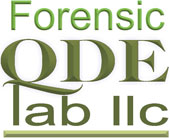CHOOSING A QUALIFIED DOCUMENT EXAMINER
Since there is no state licensing for Forensic Document Examiners, anyone can advertise and claim to be one. Anyone can mail you a flyer and say they’re competent, but that doesn’t mean they’re a real handwriting expert.
The Yellow Pages, professional legal journals and legal newspapers often contain advertisements from individuals who, while they claim proficiency, possess few if any of the minimum qualifications. Although they don’t necessarily admit it, many of them have backgrounds in Graphology or Graphoanalysis (i.e. personality assessment through handwriting). Contrary to what they would have you believe, they just aren’t forensic document examiners. Other advertisers claim their background in Criminalistics or in the classroom qualifies them to examine and determine authenticity of documents they’re not necessarily competent either.
While many reputable document examiners do advertise in these publications, the problem is one of determining just who is and who isn’t qualified to handle your document problem. Do you need a handwriting identification? Documentation examinations? Digital signature research? Forensic document analysis? As you can, there can be a wide variety of needs.
What is a Forensic Document Examiner?
A forensic document examiner discovers and proves the facts regarding documents. The bulk of the examiner’s caseload rests upon answering questions regarding authorship, authenticity, alterations, additions and erasures. However, a document examiner may be called upon to determine the significance of inks, paper, writing instruments, business machines, and other features of documents. A report is then prepared regarding examination findings, and the examiner stands ready to demonstrate these findings as an expert witness.
-The Forensic Sciences Foundation, Inc.
Who is Competent?
Completion of a Full-Time Two-Year Training Program
Training must be considered the single, most important factor in determining competency. There is no academic institution that currently confers a degree that certifies competency in Forensic Document Examination. According to the American Board of Forensic Document Examiners (ABFDE), it takes TWO years of full-time training in a recognized document laboratory to qualify a trainee to a level of only minimal competence. Training should include the study of all aspects of questioned documents and expertise is gained only with the examination of thousands of documents in a variety of cases.
Experience and Full-Time Practice
The qualified examiner works at the profession full-time. Trying to practice this profession on a part-time basis makes it extremely difficult, if not impossible, to maintain proficiency and stay abreast of the latest developments in the field. To be fully competent, a document examiner must be exposed to large numbers of cases over a period of years on a full-time basis.
Certification
The American Board of Forensic Document Examiners (ABFDE) is the ONLY national certifying body of forensic document examiners that was founded with “seed” money from the federal government and initially recognized and sponsored by the American Academy of Forensic Sciences and the American Society of Questioned Document Examiners. The ABFDE was organized in 1977 and, at present, certifies less than 120 active Diplomates within the U.S. and Canada.
Among the minimum qualifications that must be met for ABFDE certification are:
- Possession of a baccalaureate degree
- Completion of a two-year, full-time training program at a recognized document laboratory
- An additional two years of full-time independent document work
- The full-time practice of forensic document examination
- Pass a comprehensive written and /or oral examination
While there undoubtedly are qualified examiners who do not possess ABFDE certification, those granted Diplomate status by the board have been formally recognized as meeting certain minimum professional qualifications.
Expert Testimony
Qualified forensic document examiners testify as experts in both criminal and civil trials in federal, state and local courts and administrative hearings.
Continuing Education and Professional Memberships
Continuing education is necessary to maintain proficiency and should include attendance and participation in professional meetings, seminars and specialized training courses (e.g. U.S. Secret Service and F.B.I. Academy courses on Questioned Documents, Photocopier and Signature Seminars, etc.).
While membership in organizations relating to forensic questioned documents and presenting research papers do not necessarily insure proficiency, they certainly attest to a professional commitment and imply competence.
National organizations include the Questioned Document Section of the American Academy of Forensic Sciences, the American Society of Questioned Document Examiners and the International Association for Identification. Local associations include the Southwestern Association of Forensic Document Examiners and other regional associations of forensic scientists. These organizations have stringent membership and attendance requirements.
Equipment and Professional Library
Qualified examiners should have an extensive up-to-date library with books, professional journals and articles written by recognized experts. Technical equipment will include such items as:
- A stereoscopic binocular microscope and hand magnifiers to view documents under proper magnification.
- An Electrostatic Detection Apparatus (ESDA or similar device) to detect and visualize indentations on paper.
- A Video Spectral Comparator (or similar device) to detect differences in inks with ultraviolet and infrared irradiation.
- Test grids to detect alterations to typewritten documents
Do your Homework
Establishing credentials before selecting your expert may mean the difference between winning or losing; it may also save your client large sums of money in unnecessary litigation fees and adverse judgments. An incompetent “expert” can wreak havoc with your case and your reputation.
Do your homework and make the right choice!
Thanks to my colleague, David Moore, D-ABFDE for allowing me to use his web content for this page.
For more information or help with your handwriting signature analysis or document examination in the San Diego area, you can contact me at Forensic QDE Lab, llc in Escondido, CA. 888-760-0339
